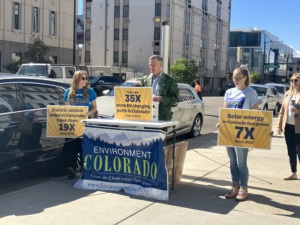Alexandra Simon
Public Health Advocate, CoPIRG Foundation
Public Health Advocate, CoPIRG Foundation
Clean Air Advocate, CoPIRG Foundation

CoPIRG Advocate Alex Simon and Senator John Hickenlooper speak about the benefits for consumers in the Inflation Reduction Act.Photo by Len Montgomery | Used by permission
DENVER – Colorado ranks 7th in the nation for growth in wind energy production since 2012 and 7th and 8th for growth in electric vehicle charging ports and sales, respectively, according to a new online dashboard released today by Environment Colorado Research & Policy Center. The dashboard, Renewables on the Rise 2022, documents state-by-state growth of six key clean energy technologies across the United States over the past decade: wind power, solar power, battery storage, energy efficiency, electric vehicles and electric vehicle charging stations.
“As the impacts of Colorado’s worsening air pollution become more tangible in our daily lives, so does the urgency of switching to renewable energy sources,” said Alex Simon, Public Health Advocate with CoPIRG Foundation. “Colorado’s success in increasing access to electric vehicles and charging infrastructure stems from smart policies that are increasing options for consumers across the state.”
In addition, Colorado ranks 14th for growth in solar, 23rd for growth in battery storage and 10th for growth in energy efficiency.
“Colorado leads the way on wind and solar energy,” said U.S. Senator John Hickenlooper. “Our new climate bill will help us lower energy costs for Coloradans.”
Between 2012 and 2021, Colorado’s electric vehicle sales increased 19-fold and the state’s number of electric vehicle charging ports increased 35-fold. Since 2021, the state has seen its solar energy generation increase seven-fold and a 151% increase in wind power production since 2021.
“Thank you to Environment Colorado and CoPIRG for highlighting the work our state is doing to embrace renewables,” said Colorado Energy Office Deputy Director Dominique Gómez. “From electricity generation and electric vehicles to innovation in renewable options such as geothermal and clean hydrogen, Colorado is rapidly transitioning to a clean energy economy. We will continue to push policies and programs that not only reduce emissions but also save Coloradans money.”

Senator Hickenlooper is joined by campaign associates from Environment Colorado to celebrate Colorado’s progress in renewable energy.Photo by Len Montgomery | Used by permission
The Inflation Reduction Act, passed by Congress this summer and signed by President Biden offers consumers tax credits and discounts on more than a dozen types of energy-saving purchases, including new and used electric vehicles, rooftop solar, geothermal heating and cooling, upgrading electric panels, and heat pump HVAC systems, water heaters and clothes dryers. Some of the credits are in effect now, and many will take effect in 2023.
At the event, CoPIRG Foundation highlighted their online guide on the Inflation Reduction Act tax incentives that can help people save money and reduce climate pollution alongside an online tax incentive calculator developed by Rewiring America.
Modeling by Energy Innovation found that the provisions in the Inflation Reduction Act will spur clean energy and reduce pollution from fossil fuels, preventing up to 4,500 premature deaths and up to 119,000 asthma attacks annually by 2030.
“The IRA has opened the door for consumers in Colorado to use tax credits and discounts to save thousands of dollars on home energy costs like solar panels and heat pumps, while also making smart choices for our air quality and environment,” said Simon.
###